De Britse schrijver en regisseur Hanif Kureishi werd geboren op 5 december 1954 in Bromley, Kent. Zie ook alle tags voor Hanif Kureishi op dit blog.
Uit: The Black Album
„The college was a cramped Victorian building, an old secondary school […]. It was sixty percent black and Asian, with an ineffective library and no sports facilities. Its reputation was less in the academic area but more for gang rivalries, drugs, thieving and political violence. It was said that college reunions were held in Wandsworth Prison.
In the early morning rush […] he shoved through turnstiles, past the security guards who occasionally frisked students for weapons, and into the lightless canteen for coffee […]. He couldn`t wait to see Deedee Osgood.
Knowing it was time to take the initiative, he went to find her […]. After knocking on her door, in the moment before she introduced herself, he thought she was a student. Her office was only three times the size of a telephone booth. Pinned above the desk were pictures of Prince, Madonna and Oscar Wilde, with a quote beneath it, `All limitations are prisons.´
Deedee interrogated him about his life in Sevenoaks and his reading. Despite her difficult questions about Wright and Ellison, Alice Walker and Toni Morrison, she was willing him to do well, he could feel that.
Noticing him looking at the Prince photograph, she said, `You like Prince?´
He nodded.
`Why?´
Idly he said, `Well, the sound.´
` Anything else?´
Grasping that this was not chatter but part of the interview he strained to order his words into sense, but for months he`d barely spoken to anyone with half a brain. She coaxed him. `He`s half black and half white, half man and half woman, half size, feminine but macho too. His work contains and extends the history of black American music, Little Richard, James Brown, Sly Stone, Hendrix…´
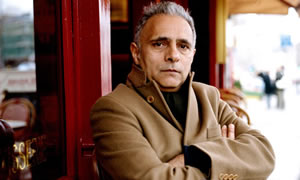
Hanif Kureishi (Bromley, 5 december 1954)
De Amerikaanse schrijfster Joan Didion werd geboren in Sacramento Valley op 5 december 1934. Zie ook alle tags voor Joan Didion op dit blog.
Uit: Political Fictions
„The aides gave us the details, retold now like runes. Promptly at nine o’clock on most mornings of the eight years he spent as president of the United States, Ronald Reagan arrived in the Oval Office to find on his desk his personal schedule, printed on green stationery and embossed in gold with the presidential seal. Between nine and ten he was briefed, first by his chief of staff and the vice president and then by his national security adviser. At ten, in the absence of a pressing conflict, he was scheduled for downtime, an hour in which he answered selected letters from citizens and clipped items that caught his eye in Human Events and National Review. Other meetings followed, for example with the congressional leadership. “I soon learned that these meetings lasted just one hour, no more, no less,” Tony Coelho, at the time majority whip in the House, told us in Recollections of Reagan: A Portrait of Ronald Reagan, a I997 collection of reminiscences edited by Peter Hannaford. “If the agenda-which he had written out on cards- wasn’t completed at the end of the hour, he would excuse himself and leave. If it was finished short of an hour, he would fill the rest of the time with jokes (and he tells a good one).” During some meetings, according to his press secretary, Larry Speakes, the president filled the time by reciting Robert Service’s “The Cremation of Sam McGee.”
When the entry on the schedule was not a meeting but an appearance or a photo opportunity, the president was rehearsed. “You’ll go out the door and down the steps,” Michael Deaver or someone else would say, we were told by Donald Regan, secretary of the treasury from 1981 until I985 and White House chief of staff from I985 until I987. “The podium is ten steps to the right and the audience will be in a semi-circle with the cameras at the right end of the half-moon; when you finish speaking take two steps back, but don’t leave the podium, because they’re going to present you with a patchwork quilt.” It was Larry Speakes, in his I988 Speaking Out: The Reagan Presidency from Inside the White House, who told us how, at the conclusion of each meeting or appearance, the president would draw on his schedule a vertical line downward and an arrow pointing to the next event. “It gives me a feeling that I am accomplishing something,” the president told Speakes.“
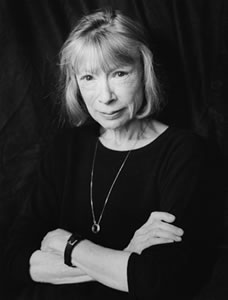
Joan Didion (Sacramento Valley, 5 december 1934)
De Amerikaanse schrijver, journalist en columnist Calvin (Bud) Marshall Trillin werd geboren op 5 december 1935 in Kansas City, Missouri. Zie ook alle tags voor Calvin Trillin op dit blog.
Uit: Obliviously On He Sails: The Bush Administration in Rhyme
A scientific obervation of the speaking problems that seem to run in the Bush family
He thinks that hostiles hostage.
He cannot say subliminal.
The way Bush treats the language
Is bordering on criminal.
His daddy had the problem:
He used the nounless predicate.
Those cowboy boots can do that
To people from Connecticut.
Cheney’s Head: An Explanation
One mystery Ive tried to disentangle:
Why Cheneys head is always at an angle.
He tries to come on straight, and yet I cant
Help notice that his head is at a slant.
When Cheneys questioned on the Sunday shows,
The Voice of Reason is his favorite pose.
He drones in monotones. He never smiles
Explaining why some suspects dont need trials,
Or why right now it simply stands to reason
That criticizing Bush amounts to treason,
Or which important precept it would spoil
To know who wrote our policy on oil,
Or why as CEO he wouldnt know
What Halliburtons books were meant to show.
And as he speaks Ive kept a careful check
On when his heads held crooked on his neck.
The code is broken, after years of trying:
He only cocks his head when he is lying.
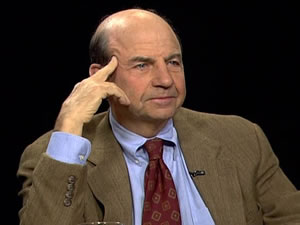
Calvin Trillin (Kansas City, 5 december 1935)
De Duitse dichteres en schrijfster Eugenie Marlitt werd geboren op 5 december 1825 in Arnstadt. Zie ook alle tags voor Eugenie Marlitt op dit blog.
Maßliebchen im Schnee
Was will der Winter in der Blütenzeit?
Ward ihm zu eng sein Reich im kalten Norden?
Er sah den Frühlingsjubel weit und breit
Und sprengte grimmig seines Hauses Pforten.
Nun stürmt er wild daher, der rauhe Greis,
Bedeckt die junge Frühlingswelt mit Flocken.
O zartes Grün, du blickst aus starrem Eis
So trüb, wie Myrtenreis aus greisen Locken!
Maßliebchen zittert im beschneiten Gras,
Es fürchtet sich vor Winters Zorngebärde,
Sein neues, grünes Kleid ist tränennaß,
Das Köpfchen senkt sich schwer zur kalten Erde.
Verschwunden ist der kleinen Krone Gold,
Der Blätterkreis hat schützend sich erhoben,
Drin ruht des Blümchens Kleinod, süß und hold
Geborgen vor der rauhen Stürme Toben.
So flüchtet scheu das sinnige Gemüt
In sich zurück wie jene Frühlingsblume,
Wenn roher Scherz entweiht was still erblüht
In seiner Tiefe, seinem Heiligtume.
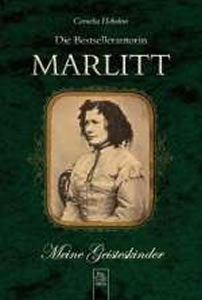
Eugenie Marlitt (5 december 1825 – 22 juni 1887)
Boekomslag
De Indische dichter Josh Malihabadi werd geboren in Malihabad in Brits India op 5 december 1898. Zie ook mijn blog van 5 december 2008.
There she sweats on the road
There she sweats on the road, a beauteous, restless lass,
In scorching sun she breaks the stones, her bangles clink and clash.
A painful moan with the music strangely mixed up lies,
At each stroke dropes of tears trickle down her eyes.
Dust-splattered are her cheeks, her locks embroiled in dust,
Her deep depressed eyes a tender grace reflect.
The blood-red sun sucks her blood without a touch of ruth,
Each heavey hammer stroke tells upon her budding youth.
In the sun her fragrant locks are flying about adrift,
Her limber self is getting wrecked amid the stones and bricks.
Ruddy rays of the sun are drinking undefied,
The wine of her jasmine cheeks, nectar of narcissus’ eyes.
Clouds of sorrow heavily hang o’er her tender heart,
Are these her cheeks, or roses two which are fading fast?
Through her tatters can be glimpsed her youthful shape, sorrow-gripped,
Like the moon that wanders through bits of clouds adrift.
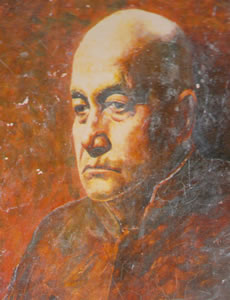
Josh Malihabadi (5 december 1898 – 22 februari 1982)
De Duitse schrijver Hans Hellmut Kirst werd geboren op 5 december 1914 te Osterode (voorm. Ost Preussen, nu Polen). Zie ook alle tags voor Hans Hellmut Kirst op dit blog.
Uit: 08/15
»Eingeteilte links ‘raus!« rief Hauptwachtmeister Schulz, allgemein nur »der Spieß« genannt. Seine Stimme dröhnte über den Appellplatz und flackerte von den Wänden der Kasernenbauten wider. Es war eine mächtige, satte, selbstzufriedene Stimme; Bierdunst und Zigarettenrauch hatten sie eingeölt und angerauht. Schulz hörte sie gerne.
Die Eingeteilten trabten zufrieden nach links; die Nichteingeteilten schlossen mechanisch rechts auf. Der Kanonier Vierbein geriet kurz ins Gedränge, versuchte vorsichtig seine Ellenbogen zu gebrauchen, gab dann nach, stand still; wie ein Pfahl.
»Wie die Denkmäler!« rief der Spieß zufrieden. »Wie die Ölgötzen! Kein Schwanz rührt sich.« Und er blinzelte kurz hinüber zu den Fenstern seiner Dienstwohnung, die weit geöffnet waren, und er bemerkte seine Frau Lore hinter den Gardinen und war überzeugt davon, daß sie ihn bewunderte.
Die Funktionsunteroffiziere, die sich hinter ihrem Spieß versammelt hatten, bemühten sich, nicht zu grinsen. Es gelang ihnen gut, denn sie hatten viel Gelegenheit gehabt, das zu üben.
Der Kanonier Vierbein starrte geradeaus. Er visierte ein Fensterkreuz im Kasernengebäude an. Sein Blick klammerte sich an dem Holz fest. Dort wurde der Kopf von Lore Schulz sichtbar, aber der Kanonier zwang sich dazu, nur Holz zu sehen. Der Hauptwachtmeister schob sich an ihm vorbei, und es war, als rollte er vorüber wie auf einem Fließband. Er geriet kurz in das Blickfeld des Kanoniers hinein, gleich einem Fremdkörper, der in das Scheinwerferlicht eines Autos hineingerät; schwebte dann wieder hinaus, andere Blickfelder durchkreuzend.
Der Hauptwachtmeister stellte sich vor seinen Untergebenen im Mannschaftsrang breitbeinig auf. Er war ein Mann wie ein Schrank, der auf Säulen ruhte. Sein rundes, gesundes, glänzendes Gesicht zog sich in die Länge, und ein großer Mund wurde aufgerissen.
»Dann wollen wir mal!« rief der Spieß dröhnend.
Jeden Samstagnachmittag verzeichnete der Dienstplan »Revierreinigen« und sah dafür eine Zeit von drei Stunden vor, die Schulz, wenn er dazu Lust hatte, mühelos auf fünf Stunden auszudehnen vermochte. Meistens hatte er Lust dazu.“
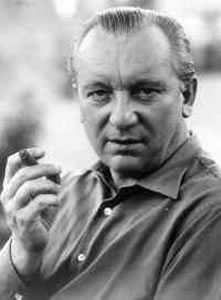
Hans Hellmut Kirst (5 december 1914 – 23 februari 1989)
